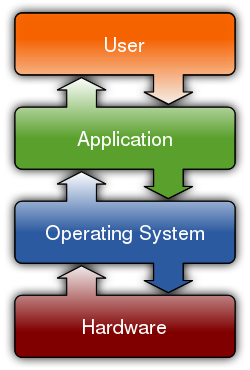Difference between revisions of "Operating system"
(Created page with "{{concept |wikipedia=https://en.wikipedia.org/wiki/Operating_system |image=Operating system placement.svg |constitutes=computer software }} An '''operating system''' controls...") |
(filesystem) |
||
| (2 intermediate revisions by one other user not shown) | |||
| Line 4: | Line 4: | ||
|constitutes=computer software | |constitutes=computer software | ||
}} | }} | ||
| − | An '''operating system''' controls the computer hardware and allows its operation by software applications. | + | An '''operating system''' controls the computer hardware and allows its operation by software applications. |
| + | |||
| + | ==Open source or proprietary?== | ||
| + | {{FA|Open source}} | ||
| + | Operating systems may be [[open source]] (such as [[Linux]], [[Resurrection Remix OS]] or [[Lineage OS]]) or closed-source (such as [[Microsoft Windows]] or [[Apple]]'s [[MacOS]] or [[iOS]]). Open-source (non-proprietary) operating systems allow users to inspect their source code. | ||
==Popularity== | ==Popularity== | ||
The most widely used operating systems as of 2018 are [[Microsoft Windows]] and [[Android]], each installed on slightly over 1/3 of computing devices as of April 2018.[[iOS]] and [[OSX]] between them account for almost 20%. The fifth most popular operating system was [[Linux]], which had about 0.7% as of April 2018.<ref>http://web.archive.org/web/20180421112838/http://gs.statcounter.com/os-market-share</ref> | The most widely used operating systems as of 2018 are [[Microsoft Windows]] and [[Android]], each installed on slightly over 1/3 of computing devices as of April 2018.[[iOS]] and [[OSX]] between them account for almost 20%. The fifth most popular operating system was [[Linux]], which had about 0.7% as of April 2018.<ref>http://web.archive.org/web/20180421112838/http://gs.statcounter.com/os-market-share</ref> | ||
| + | |||
| + | ==Problems== | ||
| + | ===Filesystem=== | ||
| + | There are observations that students in the US, since around [[2017]], do not understand the concept of a filesystem any longer; since most have spent their time not with classic personal computers, but with mobile devices.<ref>https://www.theverge.com/22684730/students-file-folder-directory-structure-education-gen-z</ref> | ||
{{SMWDocs}} | {{SMWDocs}} | ||
==References== | ==References== | ||
{{reflist}} | {{reflist}} | ||
| − | |||
Latest revision as of 18:48, 14 March 2024
(computer software) | |
|---|---|
 | |
An operating system controls the computer hardware and allows its operation by software applications.
Contents
Open source or proprietary?
- Full article: Open source
- Full article: Open source
Operating systems may be open source (such as Linux, Resurrection Remix OS or Lineage OS) or closed-source (such as Microsoft Windows or Apple's MacOS or iOS). Open-source (non-proprietary) operating systems allow users to inspect their source code.
Popularity
The most widely used operating systems as of 2018 are Microsoft Windows and Android, each installed on slightly over 1/3 of computing devices as of April 2018.iOS and OSX between them account for almost 20%. The fifth most popular operating system was Linux, which had about 0.7% as of April 2018.[1]
Problems
Filesystem
There are observations that students in the US, since around 2017, do not understand the concept of a filesystem any longer; since most have spent their time not with classic personal computers, but with mobile devices.[2]
Examples
| Page name | Description |
|---|---|
| Android | A widely used mobile operating system |
| IOS | The operating system used by Apple |
| Incompatible Timesharing System | |
| LineageOS | An alternative to Android, as of 2019 supporting 185 models of cellphone. |
| Linux | The world's most popular open source operating system. "More secure than its competitors" |
| MacOS | Apple's closed source operating system that GNU terms "malware". |
| Resurrection Remix OS | A mobile operating system |
| Unix | |
| Windows | A closed source operating system by Microsoft. |